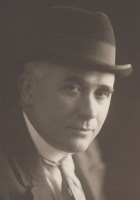Edward George Dyson Biography
Edward George Dyson was an Australian poet, journalist and short story writer.
He was born at Morrisons near Ballarat in March 1865. His father, George Dyson, arrived in Australia in 1852 and after working on various diggings became a mining engineer, his mother came from a life of refinement in England. The family led a roving life during Dyson's childhood, moving successively to Alfredton, Bendigo, Ballarat and Alfredton again.
Unconsciously the boy was storing for future use the life of the miners, farmers and bushmen, among whom he lived. At 12 he began to work as an assistant to a travelling draper, after that was a whimboy in a mine, and for two or three years an assistant in a factory at Melbourne. This was followed by work in a newspaper office. At 19 he began writing verse, and a few years later embarked on a life of free-lance journalism which lasted until his death.
His first notable work was "The Golden Shanty", which appeared in the Bulletin, and many other short stories followed. In 1896 he published a volume of poems, Rhymes from the Mines, and in 1898 the first collection of his short stories, Below and On Top. In 1901 his first long story The Gold-stealers was published in London, which was followed by In the Roaring Fifties in 1906. In the same year appeared Fact'ry 'Ands, a series of more or less connected sketches dealing with factory life in Melbourne in a vein of humour. Various other stories and collections of stories were published in the Bookstall Series and will be found listed in Miller's Australian Literature. Another volume of verse Hello, Soldier! appeared in 1919.
All through the years Dyson did an enormous amount of work until he broke down under the strain and died after a long illness on 22 August 1931. He married Miss Jackson who survived him with one daughter.
Edward Dyson was the brother of Will Dyson and Ambrose Dyson.
Australia, my native land,
A stirring whisper in your ear—
'Tis time for you to understand
Your rating now is A1, dear.
...
The Viennese authorities have melted down
the great bell in St. Stephen's to supply metal
for guns or muntions. Every poor village
...
When the horse has been unharnessed and we've flushed the old machine,
And the water o'er the sluice is running evenly and clean;
When there's thirty load before us, and the sun is high and bright,
And we've worked from early morning and shall have to work till night,
...
He's an old grey horse, with his head bowed sadly,
And with dim old eyes and a queer roll aft,
With the off-fore sprung and the hind screwed badly,
And he bears all over the brands of graft;
...
‘NO, you can’t count me in, boys; I’m off it—
I’m jack of them practical jokes;
They give neither pleasure nor profit,
...
